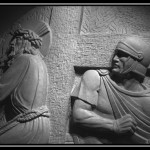We run our website the way we wished the whole internet worked: we provide high quality original content with no ads. We are funded solely by your direct support. Please consider supporting this project.

Did Christ Call Us to be Moral Guardians?
Whenever Christians try to enforce their doctrines or morals on others, the result has usually been at least as bad as any non-Christian version of the kingdom of this world. Even more concerning, it’s been far more damaging to the kingdom of God than any other version of the kingdom of the world.
There’s no indication that Christians are better qualified for being moral guardians than the rest of the world. That seems to be as true today as it has been in the past. The arbitrary way many Christians seem to decide what needs addressing and what doesn’t undermines our credibility as moral spokespeople. The fact that many Christians are publicaly more upset about gay marriage than about greed, gluttony, violence and many other things is a case in point.
Many people view the moral compass of Christians, as a whole, to be quite bizarre. Issues related to sex get massive amounts of attention while issues related to corporate greed, societal greed, homelessness, poverty, racism, the environment, racial injustice, genocide, war, and the treatment of animals typically get little attention.
When Christians assume the posture of knowing what is best for society, it only serves to further undermine the credibility of the good news we are commissioned to proclaim.
Does this mean that Christians shouldn’t speak out on moral issues? Absolutely not! We should speak out, but we should do so in a distinctly kingdom way. We should speak with self-sacrificial actions more than with words. We should speak not as moral superiors but as self-confessing moral inferiors.
We should call attention to issues by entering into solidarity with those who suffer injustice. We should seek to free people from sin by serving them, not be trying to lord over them. And we should trust that God will use our Calvary-like service to others to advance his kingdom in the world.
The distinctively kingdom question is, How should we live? How can we individually and collectively serve those in our culture who are struggling with moral questions. Take for instance the question of abortion. How can we walk with women struggling with unwanted pregnancies? How can we who are worse sinners than any woman with an unwanted pregnancy sacrifice our time, energy, and resources to ascribe unsurpassable worth to them and their unborn children? How can we act in such a way that we communicate our agreement with Jesus that these women and their unborn children are worth dying for? How can we serve them so that it becomes feasible for the mother to go full term?
We don’t need to answer any of the world’s difficult political and metaphysical questions to do these things. The unique kingdom approach to abortion isn’t dependent upon convincing ourselves and others that we have “God’s knowledge” about these questions. The unique kingdom approach depends upon our hearing the call to love as Jesus loved.
The kingdom approach costs much. But it is precisely this costliness that makes it a unique kingdom approach. Because it manifests the beauty of Jesus, it glorifies God and has a power to change the world in a way that kingdom-of-the-world strategies never could.
—Adapted from The Myth of a Christian Nation, pages 139-144
Category: General
Tags: Myth of a Christian Nation
Topics: Following Jesus
Related Reading

What Would You Change About Myth of a Christian Nation Now? (podcast)
Greg and Matt Tebbe discuss Myth of a Christian Nation. http://traffic.libsyn.com/askgregboyd/Episode_0702.mp3

Is America Uniquely “Under God”?
As a rallying slogan for our civil religion, the proclamation that we are “one nation under God” arguably serves a useful social function, for it gives many Americans a sense of shared values and vision. But it is not a slogan kingdom people in America should take too seriously. We must always remember that, while…

Why NO Violence in Jesus’ Name is Justified
Image by papapico via Flickr On Friday, Greg posted a response to Obama’s speech about religiously-inspired violence. Here are some further thoughts on why violence in the name of Jesus—no matter whether we call it just, redemptive, or defending ourselves—is just another form of kingdom-of-this-world living. The love we are called to trust and emulate is supremely…

Greg Shares His Journey and Some Challenges Ahead
http://youtu.be/YdZKPG20kmQ Last September, Greg was asked to give the opening address at the Missio Alliance event Church & Post-Christian Culture: Christian Witness in the Way of Jesus. You can find more information here. Special thanks to our very own Stephen Konsor for his role in filming and editing this and other sessions. Enjoy!

How the Church is Tempted to “Do Good”
The previous post spoke of God’s call to the church to be resident aliens: a holy, distinct people who are set apart and peculiar when compared to the patterns of the world. The holiness of God’s kingdom is cruciform love, which constitutes our distinct witness to the world. Preserving this holiness and resisting the Devil’s…

How Judgment Makes Us Hypocrites
The previous post addressed how the church is to be people of love not judgment, which means that the church is not called to be the moral guardian of the culture. What we often fail to see is the fact that when Christians assume the position of moral guardians, they earn the charge of hypocrisy.…
